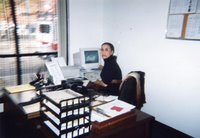
Vertigo, or where oh where did I leave my sense of balance?
It appeared for a few days there that I'd spend the rest of my life with my head pointed in but one direction with no checking out those things beyond what front-face presents. What a miserable ailment this is! Had it once before -- no idea what caused it then nor what took it away. One day (about ten years ago), I woke listing dangerously and unable to stabilize. My body tended to follow my head -- and my head was on some kind of path unrelated to the rest of me. One quick turn of my head and the world would spin crazily! Miserable!
Having been blessed with the best of health for the greater part of life leaves me with no way to defend against such a random attack. What's left of my brain immediately begins to conjure up visions of strokes and heart attacks and any other wandering ailment I see advertised on the tube. Felt as if I'd gotten myself one of each of those side effects that get tagged on to the end of those pharmaceutical commercials. So much for that.
But vertigo may be stress related -- not bad stress, just stress. Since returning home I've been back in the thick of work -- the best kind, actually. Case in point:
Two weeks ago we drove to Sacramento to watch the panel hearings for grant applications. This was for Proposition 40 bond moneys for historic preservation. We'd (the park and the Rosie Trust) submitted a large grant that would enable us to restore one of the Kaiser historic sites -- the Maritime Child Development Center; the first 24 hour-a-day childcare center in the nation. The old building stands abandoned and has for most of the last 60 years. It was hurriedly constructed early in World War II without a foundation. The place is riddled with mold; has rippling floors and smells of putrid dry rot. However, in that building (and another such childcare center some blocks away) is a treasure trove of child-sized furniture, toys, tricycles, red wagons, wood construction blocks, cribs and desks, home made children's kitchen furnishings, all stacked as if the children walked away yesterday.
Once restored, it will become one of the scattered sites of the Rosie the Riveter/Home Front Historical Park, with at least one specimin classroom open to the public. The rest of the large building will be rented out to nonprofits -- one of which is an environmental program for teens. It's an exciting step toward the actualization of another piece of the park we're building.
Word came within 24 hours of our visit to the capitol that we'd been selected. That means 2 million dollars (to be matched) is now available to the city and the park with which to begin that work.
Funny, two years ago it would have concerned me that the child development center was created to make it possible for white women to be hired into the homefront workforce. Black children were not accepted, but were cared for the way they would have been in the south from whence they'd come. These were largely sharecroppers who'd come to the west coast to work in the shipyards -- and who would have had no expectation for childcare, so it mattered not. They came with a strong tradition of collective parenting, and it served them well in Richmond. It had to. Or maybe this was also the home of the nation's first latch-key children.
The park development's darker side surfaces and subsides in what is becoming a familiar pattern. That we're in the process of enshrining a period of racial segregation is important but only inasmuch as we do that without seizing every opportunity to reexamine those times and work our way carefully through the conflicts that rise to the surface as we work.
I felt the same thrill that my colleagues felt when that grant announcement was made. I was ecstatic and felt just as triumphant -- but perhaps for different reasons. Maybe what is different is the fact that I've begun to lose any sense of a separation from the rest of staff -- either in our intent or in how we go about the work of re-building this important chapter in the nation's history, together.
There's an openness and a willingness to honestly face the real possibility of providing answers to questions nobody's asking. At least that's true of those with whom I'm working at the National Park Service. We may be ahead of the community in that respect so that next weeks and months may have some unknown waters to navigate. I'm determined that important history is not papered over rather than confronted. It will be in those friendly (and maybe not so friendly) encounters that the learning and the atonement will occur. We must not miss this opportunity to lay those ghosts.
What happens if the scars are deeper than I know?
No comments:
Post a Comment